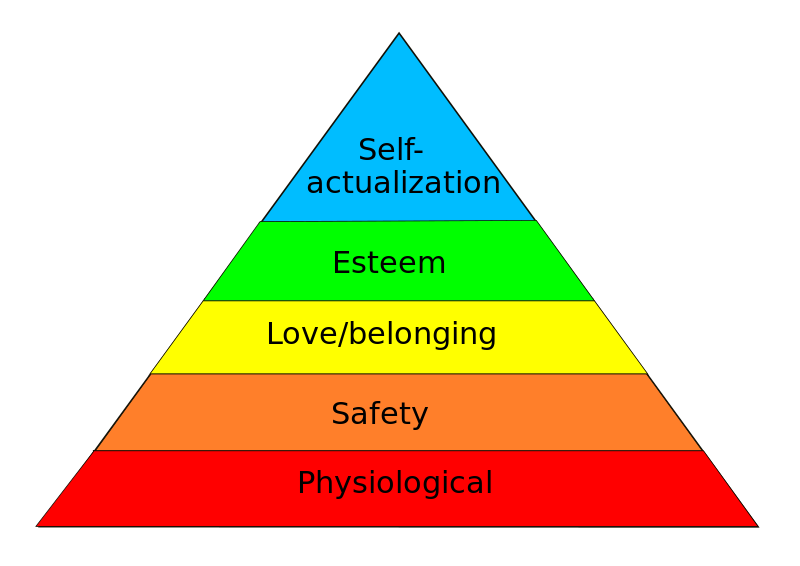REVIEW
In our last blog entitled Why Does It Matter If God Exists?, we examined atheistic existentialism and the fact that it results in “absurdity”. The term “absurdity” was defined by existentialist Albert Camus as a loss of meaning, values and purpose in life.
If there is to be meaning in our lives, Jean-Paul Sarte told us that, even though existentialism teaches us there is no actual meaning in life, we must fabricate it or pretend that there is such a thing. Without God in the picture, Camus was probably right in saying that we’re all like Sisyphus repeatedly rolling a boulder up a hill, performing meaningless, repetitive tasks with no real end in sight.
WHAT GIVES LIFE MEANING?
Many of us are not aware, and possibly don’t have time, to think about what gives our lives meaning. What gives you hope when you wake up in the morning? What motivates you? What are you excited about? Where do you focus most of your concentration and energy?
If you’ve lost that motivation, think back on your life when you were the happiest. What was going on then? What made you happy? What gave you satisfaction? Was there ever a time when you were content or happy?

MASLOW’S HIERARCHY OF NEEDS
In 1943, psychologist Abraham H. Maslow, after studying the top 1% of highly-functioning people, wrote a paper entitled “A Theory of Human Motivation” in which he presented his concept of a hierarchy of needs that eventually took the form of a pyramid. He said that the most fundamental needs are the requirements for human survival: physiological needs like air, water, food, clothing and shelter.
Once these needs are met, Maslow said that our primary focus or motivation turns to: safety needs like economic safety (job security, savings, insurance), personal security (self-defense), health and well-being (exercise, diet, etc.).
According to Maslow, once physiological and safety needs are met, any person will then focus on the needs of love and social belonging such as family, friendships, intimacy. People have a need for belonging and acceptance among social groups.
Fourthly, Maslow said, there is then a focus on self-esteem or self-respect, in other words, to be accepted and valued by others. This can be accomplished by gaining recognition that makes the individual feel they are making a contribution to society.
It was Maslow’s hypothesis that the needs represented by the first four levels of the pyramid had to be met before a person could achieve what he called “self-actualization,” a term used to indicate one who has “achieved their full potential” as a human being. Maslow believed that this level would not be reached until the other four were accomplished.
Whether those four levels of need must be met before we can achieve our full potential depends a great deal on how we define a person’s “potential.” I could be extremely talented and intelligent but find myself caught in a predicament where I spend most of my effort and concentration in life struggling for food, water, clothing and shelter.
Even though I am stuck at that level where I am constantly struggling to meet my physical needs, would it be impossible for me to find significant meaning in life even though my need for safety, love, belonging and self-esteem had not yet been met? No, it would not.
Isn’t it possible to still find meaning and purpose in my life in the midst of a struggle just to put food on the table? We believe the answer is “yes.”
THE HUNGER OF THE SOUL
Regardless of where they find themselves on Maslow’s hierarchy, there is a hunger in peoples’ souls for something more than just bread. There is a hunger for truth, for love, for fellowship, for significance. There are certain worldviews that might meet some of those needs, but very few can satisfy a person’s soul to the point that there is real joy and a sense of purpose or meaning.
Pain can often drive us to search for truth and for answers, but it is often our weariness with pleasure that drives us to think about spiritual matters.
Pain forces us to face how finite our lives really are. It can result in a more cynical approach to life and in fatigue. However, it sometimes causes us to be more introspective and seek a greater power than ourselves.
We often think of pleasure as an end in itself. However, the pleasure that we find in things like greed, sexuality or fame tend to be momentary thrills that rarely satisfy. The continuing search for greater and greater forms of pleasure can sometimes lead to an increased sense of futility, emptiness and hopelessness.
People in pain look for comfort and an explanation. People weary of pleasure often seek a purpose.
Whether it is pain or pleasure driving us, we all have a hunger to know if there is any meaning to be found, if there is any purpose for our lives. We want to find happiness, we want to avoid pain, we want to know who we are and what we are. Pain and pleasure are indicators on the road to our eventual destiny.
In this struggle to find meaning and purpose, we all naturally sense that there is something more than our physical essence. As sentient beings who have a free will, rationality and self-conscious awareness, we all have a sense of our own personhood. This understanding often causes us to think that there is a spiritual aspect of our beings that extends beyond this physical existence.
A WORLDVIEW BEGINS WITH DEFINING TERMS
Worldviews begin with definitions. Definitions create boundaries. Violation of those boundaries elicits condemnation. That condemnation excludes. It is impossible to sustain truth without excluding falsehood. ALL religions are exclusive in this manner! They all attempt to embrace truth and exclude falsehood.
For example, it is illogical to suggest that “all religions teach the same thing.” No one really believes that. The moment someone chooses one religion over another, they’ve decided one religion’s teachings make more sense to them than another. They’ve chosen one and rejected another. Definitions and worldviews create boundaries.
A “culture” will not survive if there isn’t agreement about the meaning of the terms we’re using.
A “cultural revolution” means that we have elected to depart from the shared meanings of the past. If we examine the arguments of the finest minds in the world, we find that a culture or worldview has truth taken from it by redefining what its terms mean. This world that we live in has lost many of the shared meanings of the past.
Here is one example of this cultural change that we see around us. The phrase “religious pluralism” is a good thing, but its meaning has been distorted by those wishing to change the culture. “Religious pluralism” is a condition where there are a number of competing worldviews but no one worldview is dominant. However, some people have attempted to equate “religious pluralism” with “moral relativism,” a destructive tendency intended to uproot the traditional understanding of pluralism and revolutionize the culture.
Establishing a worldview begins by defining terms. Destroying a worldview begins by redefining terms.
THREE TESTS OF TRUTH
In testing something for truth, we need to look at three things:
1. Logical consistency – For example, a lack of contradiction (It does not violate the Law of Non-contradiction).
2. Empirical adequacy – Are there outside sources that confirm, or at least that do not contradict, the assertions that are being evaluated, or is the entire thing self-referencing? (e.g., How do you know the Koran is true? Muhammed says so. How do you know Muhammed is right? The Koran says so.)
3. Experiential relevance – Any perspective or worldview must make a difference in how we think or act.
ELEMENTS OF A SOUND WORLDVIEW
Any worldview is inadequate that cannot address these four questions:
1. Origin (Where did I come from?)
2. Meaning (Why am I here?)
3. Morality (What am I supposed to do?)
4. Destiny (Where am I going?)
A sound worldview must have eight basic components:
1. It must have a strong basis in fact.
2. A worldview must have a high degree of coherence or consistency.
3. A good worldview must give a reasonable and logical explanation for the various undeniable realities we sense all around us.
4. A good worldview will not be too complex or too simplistic.
5. A good worldview is not explained by just one line of evidence.
6. A good worldview must explain contrary worldviews without compromising its own essential beliefs.
7. A good worldview cannot argue just on the basis of private experience but must have some objective standard of measurement.
8. A good worldview must explain the essential nature of good and evil since those two alternatives are the principal characteristics differentiating human beings from all other entities or quantities.
THREE MODERN TRENDS THAT UNDERMINE A COHERENT WORLDVIEW
Three modern trends have undermined the average person’s ability to form a coherent worldview:
1. Secularism – This is the attempt to diminish the impact of religious ideas in society. For example, Christian ministers are automatically placed under suspicion as being the most biased or prejudiced people in a room, while those who are unaffiliated are automatically assumed to be objective. This attempt to diminish religious ideas is a sophistry that has resulted in a lack of shame where there rightly should be an enhanced sense of right and wrong and a remorse for wrongdoing. Secularism has resulted in “a loss of appropriate shame.”
2. Pluralism – Certainly, by its original meaning “religious pluralism” is a good thing. We said that this phrase originally referred to the existence of competing worldviews where no one worldview is dominant. However, this phrase has been hijacked and redefined as being synonymous with “moral relativism,” a destructive tendency that undermines the shared meaning of the past. Changing the definition of “pluralism” has resulted in “a loss of reason.”
3. Privatization – In changing the shared meanings of the past, our culture has now raised an impregnable wall between what is defined as appropriately public and appropriately private. This is an arbitrary and callous attempt to place a muzzle on adherents of religion, not allowing them to speak of their personal beliefs in the public square. A society ultimately speaks out of its woundedness, but how can anyone talk about the pain that they feel if they must keep it to themselves. We are ultimately spiritual, not material beings, but we cannot discuss that in the public square anymore, whereas it used to be discussed in public all the time. Privatization thus leads to “a loss of meaning.”
And so, in our search for meaning, we are fighting an uphill battle against these three trends of:
• secularism (which has resulted in a loss of appropriate shame),
• a redefinition of pluralism (which has resulted in a loss of reason), and
• privatization (where Christianity is muzzled and there is a resulting loss of meaning).
By these trends, our society has become fragmented, and we no longer share a common perspective by which we can evaluate propositions.
WORLDVIEW: A COHERENT GRID FOR EVALUATING PROPOSITIONS
If a worldview can be established, it becomes a grid for making particular judgments. In keeping with this, we said that a good worldview should not violate the Law of Non-contradiction:
• For example, to say that there are no moral absolutes and then castigate Christians for being hypocritical assumes that hypocrisy is a moral flaw and a contradictory position and therefore is to be vilified, thus a moral absolute.
• As another example, to say that there is a spark of divinity within all of us and then treat a lower caste of people as less divine is self-contradictory.
The Law of Non-contradiction, though not very popular in universities, is an “either/or” principle in logic. We cannot simultaneously embrace two contradictory assumptions. We cannot simply blend two contradictory assumptions to arrive at a middle ground as in Hegel’s dialectic (i.e., thesis, antithesis, synthesis). Logic must prevail!
One Caveat: In comparing worldviews of various religions, we should never judge a religion by its abuses. There are those who attempt to mislead by pointing only to abuses or extremism as a characterization of other religions while portraying their own religion as mainstream and normal. We should never allow someone to point solely to abuses or extremism without mentioning the normal practice of that religion.
IS IT POSSIBLE TO HOLD ONTO MEANING EVEN IN THE MOST DIRE CIRCUMSTANCES?
The Christian worldview suggests that this “sense of meaning” is available to each of us as we struggle at Maslow’s various levels of need and motivation. The book of Genesis describes the life of a person named Joseph who was sold into slavery as a teenager, was wrongly imprisoned for years, maintained a heavy reliance on God’s grace to guide his life (held onto his worldview), and eventually rose to lead Egypt out of a famine that lasted for seven years.
In his book Man’s Search for Meaning, Austrian psychiatrist and concentration camp victim Victor E. Frankl suggested that it was possible to find our full potential even in the midst of a struggle for survival:
“We must never forget that we may also find meaning in life even when confronted with a hopeless situation, when facing a fate that cannot be changed. For what then matters is to bear witness to the uniquely human potential at its best, which is to transform a personal tragedy into a triumph, to turn one’s predicament into a human achievement. When we are no longer able to change a situation, we are challenged to change ourselves.”
Victor E. Frankl, Man’s Search for Meaning (New York, Washington Square Books, 1984)
Even if you consider the Joseph narrative to be a mythical story, its application to our lives is extremely significant. During that time, Joseph’s life sunk to the lowest depths of just meeting physical needs to eventually rising to a higher level. But as Joseph’s life descended down to mere physical needs and back up the hierarchy to self-esteem and eventually what Maslow called “self-actualization,” Joseph maintained a focus on a consistent, faith-driven worldview and devotion to God.
If there is a God, isn’t it possible that Joseph, in light of the circumstances, might have been achieving his full potential as he struggled at every level of Maslow’s hierarchy? And if that is true, isn’t that story telling us that it’s possible for each of us to also rise to that level if we maintain a consistent, principled worldview that adequately addresses the reality or circumstances we must confront?
In his book, Victor Frankl suggested that it was possible to hold onto “a life of inner riches and spiritual freedom” even in the most dire circumstances:
“In spite of all the enforced physical and mental primitiveness of the life in a concentration camp, it was possible for spiritual life to deepen. Sensitive people who were used to a rich intellectual life may have suffered much pain . . . but the damage to their inner selves was less. They were able to retreat from their terrible surroundings to a life of inner riches and spiritual freedom. Only in this way can one explain the apparent paradox that some prisoners of a less hardy make-up often seemed to survive camp life better than did those of a robust nature.”
Victor E. Frankl, Man’s Search for Meaning (New York, Washington Square Books, 1984)
CONCLUSION
Psychiatrist and neurologist Victor E. Frankl again:
“There is nothing in the world, I venture to say, that so effectively helps one to survive even the worst conditions as the knowledge that there is a meaning in one’s life . . .The way in which a man accepts his fate and all the suffering it entails, the way in which he takes up his cross, gives him ample opportunity — even under the most difficult circumstances — to add a deeper meaning to his life. It may remain brave, dignified and unselfish. Or in the bitter fight for self-preservation he may forget his human dignity and become no more than an animal.”
Victor E. Frankl, Man’s Search for Meaning (New York, Washington Square Books, 1984)
Because of our nature, the unselfish choice is an extremely difficult decision for us to make without the aid of a worldview that tells us our origin, meaning, morality and destiny.

